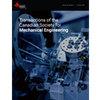GA-LQR for vehicle semi-active suspension with BiLSTM inverse model of magnetic rheological damper
IF 1
4区 工程技术
Q4 ENGINEERING, MECHANICAL
Transactions of The Canadian Society for Mechanical Engineering
Pub Date : 2023-05-19
DOI:10.1139/tcsme-2023-0027
引用次数: 1
Abstract
This paper proposes a magnetic rheological (MR) semi-active control method based on Bidirectional Long Short-Term Memory (BiLSTM) neural network, linear quadratic regulator (LQR) control algorithm and genetic algorithm (GA). The LQR algorithm with GA optimizing the weight coefficients generates the expected damping force. Due to the nonlinear hysteresis characteristics of the MR damper (MRD) and the fact that its input and output have certain time dependence, an inverse model of MRD is established by BiLSTM. The control current is predicted by BiLSTM and then the current is input to the MR damper to obtain the damping force that is infinitely close to the expected damping force. The damping force is then applied to the suspension system to form a complete closed-loop feedback control, which realizes the damping effect and generates a real-time control. The simulation results show that the MRD inverse model can accurately predict the required control current, and the GA-optimized LQR control algorithm has a good suppression effect on the vertical vehicle acceleration (VVA), dynamic tire load (DTL) and suspension dynamic stroke (SDS).基于BiLSTM磁流变阻尼器逆模型的汽车半主动悬架GA-LQR
本文提出了一种基于双向长短期记忆(BiLSTM)神经网络、线性二次调节器(LQR)控制算法和遗传算法(GA)的磁流变(MR)半主动控制方法。LQR算法与GA优化权重系数产生预期的阻尼力。由于磁流变阻尼器(MRD)的非线性磁滞特性以及其输入和输出具有一定的时间依赖性,利用BiLSTM建立了磁流变阻尼器的逆模型。通过BiLSTM预测控制电流,然后将电流输入到MR阻尼器,以获得无限接近预期阻尼力的阻尼力。然后将阻尼力施加到悬架系统上,形成完整的闭环反馈控制,实现阻尼效果并产生实时控制。仿真结果表明,MRD逆模型能够准确预测所需的控制电流,GA优化的LQR控制算法对车辆垂直加速度(VVA)、轮胎动态载荷(DTL)和悬架动态行程(SDS)具有良好的抑制效果。
本文章由计算机程序翻译,如有差异,请以英文原文为准。
求助全文
约1分钟内获得全文
求助全文
来源期刊
CiteScore
2.30
自引率
0.00%
发文量
53
审稿时长
5 months
期刊介绍:
Published since 1972, Transactions of the Canadian Society for Mechanical Engineering is a quarterly journal that publishes comprehensive research articles and notes in the broad field of mechanical engineering. New advances in energy systems, biomechanics, engineering analysis and design, environmental engineering, materials technology, advanced manufacturing, mechatronics, MEMS, nanotechnology, thermo-fluids engineering, and transportation systems are featured.

 求助内容:
求助内容: 应助结果提醒方式:
应助结果提醒方式:


